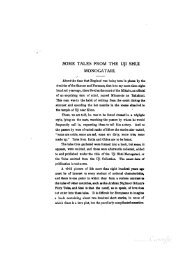Chau Ju-Kua - University of Oregon Libraries
Chau Ju-Kua - University of Oregon Libraries
Chau Ju-Kua - University of Oregon Libraries
You also want an ePaper? Increase the reach of your titles
YUMPU automatically turns print PDFs into web optimized ePapers that Google loves.
1 50 MAIiAT «MEN OF TBE SKA» (oKANG-LAUT). 1,38,8<br />
2) In Ch6u K'fl-fei's work, this island is not located, and after the words 'carried <strong>of</strong>f',<br />
Dccurs the phrase: athousands and'tens <strong>of</strong> thousands <strong>of</strong> them are sold as foreign slaves (^ ^JC)"-<br />
Conf. supra, p. 31, n. 2. Edrisi, I, 58 says that the Arabs <strong>of</strong> Oman kidnapped children on the<br />
Zanguebar coast by <strong>of</strong>fering them sweets. He also tells us (I, 61) that there was the Island <strong>of</strong><br />
Monkeys some two days distant from the African coast. The inhabitants <strong>of</strong> the islands <strong>of</strong> Khartan 5<br />
and Martan (Kurian - Murian Islands) captured the monkeys by ruse and sold them in the<br />
Yemen, where they were used as slaves. The people <strong>of</strong> Kish and <strong>of</strong> Socotra were great slave traders.<br />
T'ang-shu, 2220,8*, says that during the h'ai-yuan period (A. D. 713—742) there came a<br />
mission to China from Shi-li-fo-shi (Sumatra) which, among other things, presented two dwarf<br />
women and two women from S8ng-ti<br />
('j^ ^ ^ |_^ ^ ^ Zl), also singers and dancers. 10<br />
It seems possible, considering the constant relations between the Arabs <strong>of</strong> Sumatra with those in<br />
the African trade, that these Sbng-ti women were <strong>of</strong> the same race and country as the K'un-lnn<br />
ts'ong-k'i <strong>of</strong> our author. There was, however, in the T'ang period, an island near the north-east<br />
point <strong>of</strong> Sumatra called Ko-ko-song-chii {or ti), and SOng-ti in the present case may be an<br />
abbreviated form <strong>of</strong> that name. The T'ang-shu (loc. cit., 6») says the Sho-p'o country sent in 15<br />
A. D. 613 as tribute to China «four Song-chi slaves» (j^ f\^ j^ ^). By a slight change <strong>of</strong><br />
the second character the name may appear as Song-k'i, j^ without the dot underneath being<br />
homophonous with iffl as used by <strong>Chau</strong> <strong>Ju</strong>-kua.<br />
3. Malay „Men <strong>of</strong> the Sea" (Oraiig--laut).<br />
Sha-hiia-kung {fp ^ >^). 20<br />
«The people <strong>of</strong> the country <strong>of</strong> Sha-hua-kung are in the habit <strong>of</strong> going<br />
out on the high seas for plunder, and sell their prisoners to Sho-p'o».<br />
«Again in a south-easterly direction (from this country?) there are certain<br />
islands inhabited by savage robbers called Ma-lo-nu (^ Rp ^). When<br />
traders are driven to this country, these savages assemble in large crowds 25<br />
and, having caught the shipwrecked, roast them over a fire with large bamboo<br />
pinchers and eat them».<br />
«The chiefs <strong>of</strong> these robbers bore their teeth and plate them with yellow<br />
gold. They use human skulls as vessels for drinking and eating. The farther<br />
one penetrates among these islands, the worse the robbers are». 30<br />
Note.<br />
The whole <strong>of</strong> this chapter is taken from Ling-wai-tai-ta, 3,&^. Our author has omitted<br />
some important remarks <strong>of</strong> Chou. The latter begins by saying: «Sha-hua-kung is a country in<br />
( \') the south-eastern Sea». In the second paragraph, first line, after the word 'country', Ch6u<br />
adds 'and near the Fo country'<br />
(jg; ^ |g),<br />
which, in view <strong>of</strong> the statement made' in the 35<br />
first paragraph that the pirates <strong>of</strong> Sha-hua-kung sell their prisoners in Sho-p'o (i. e., Java), we<br />
think must stand for Fo-shi {^ ^), the name used during the T'ang period to designate<br />
Eastern Sumatra, the San-fo-ts'i <strong>of</strong> the Sung period. Probably Ch6u's authority wrote in the<br />
T'ang period, hence the use <strong>of</strong> the older name, fallen in disuse in his time. Pelliot B. E. F.<br />
E. 0., IV, 301 translated this passage <strong>of</strong> the Ling-wai-tai-ta differently; he read: eFurther to the 40<br />
south-east is the kingdom <strong>of</strong> Kin-fo, etc.» V\'e have never met with this name in Chinese works, nor<br />
apparently had Pelliot, for he <strong>of</strong>fers no explanation <strong>of</strong> it.

















